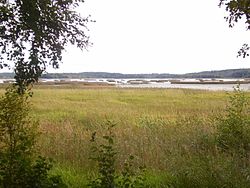
Back Urjala AVK Urjala (munisipyo) CEB Urjala German Urjala Esperanto Urjala Spanish Urjala vald Estonian اوریالا Persian Urjala Finnish Urjala French Urjala Irish
You can help expand this article with text translated from the corresponding article in Finnish. (June 2023) Click [show] for important translation instructions.
|
Urjala | |
|---|---|
Municipality | |
| Urjalan kunta Urjala kommun | |
 Kortejärvi Lake in Urjala | |
 Location of Urjala in Finland | |
| Coordinates: 61°05′N 023°33′E / 61.083°N 23.550°E | |
| Country | |
| Region | Pirkanmaa |
| Sub-region | Southern Pirkanmaa |
| Charter | 1868 |
| Government | |
| • Municipal manager | Hannu Maijala |
| Area (2018-01-01)[1] | |
| • Total | 505.37 km2 (195.12 sq mi) |
| • Land | 475.53 km2 (183.60 sq mi) |
| • Water | 30.16 km2 (11.64 sq mi) |
| • Rank | 182nd largest in Finland |
| Population (2024-08-31)[2] | |
| • Total | 4,528 |
| • Rank | 179th largest in Finland |
| • Density | 9.52/km2 (24.7/sq mi) |
| Population by native language | |
| • Finnish | 96.6% (official) |
| • Swedish | 0.3% |
| • Others | 3.2% |
| Population by age | |
| • 0 to 14 | 12.9% |
| • 15 to 64 | 54% |
| • 65 or older | 33.1% |
| Time zone | UTC+02:00 (EET) |
| • Summer (DST) | UTC+03:00 (EEST) |
| Website | www |
Urjala (Finnish: [ˈurjɑlɑ]; Swedish: Urjala, also Urdiala) is a municipality of Finland. It is part of the Pirkanmaa region, near the town of Forssa. The municipality has a population of 4,528 (31 August 2024)[2] and covers an area of 505.37 square kilometres (195.12 sq mi) of which 30.16 km2 (11.64 sq mi) is water.[1] The population density is 9.52 inhabitants per square kilometre (24.7/sq mi).
Neighbouring municipalities are Akaa, Forssa, Humppila, Hämeenlinna, Punkalaidun, Sastamala, Tammela, and Vesilahti. The city of Tampere is located 60 kilometres (37 mi) north of Urjala.
The municipality is unilingually Finnish.
The oldest glassblowing factory in Finland is located in the village of Nuutajärvi, Urjala.
- ^ a b "Area of Finnish Municipalities 1.1.2018" (PDF). National Land Survey of Finland. Retrieved 30 January 2018.
- ^ a b "Finland's preliminary population figure was 5,625,011 at the end of August 2024". Population structure. Statistics Finland. 2024-09-24. ISSN 1797-5395. Retrieved 2024-09-25.
- ^ "Population growth biggest in nearly 70 years". Population structure. Statistics Finland. 2024-04-26. ISSN 1797-5395. Retrieved 2024-04-29.
- ^ "Population according to age (1-year) and sex by area and the regional division of each statistical reference year, 2003–2020". StatFin. Statistics Finland. Retrieved 2 May 2021.
- ^ a b "Luettelo kuntien ja seurakuntien tuloveroprosenteista vuonna 2023". Tax Administration of Finland. 14 November 2022. Retrieved 7 May 2023.
